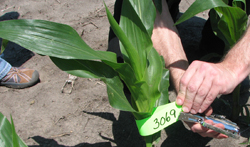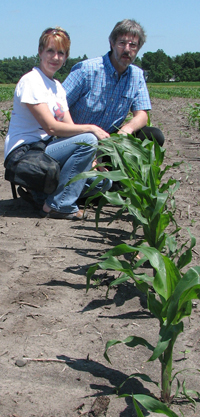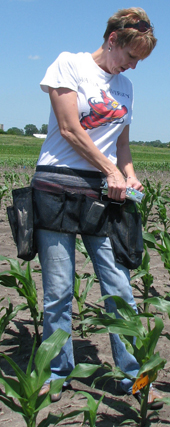AMES, Iowa - The prospect of rising temperatures in Iowa and the Midwest is predicted to lead to a dramatic decline in corn yield. With a $5 million grant from the U.S. Department of Agriculture, Iowa State University researchers are looking to develop a corn variety that maintains the region's high yields even as temperatures rise.

Alan Myers, professor, and Tracie Hennen-Bierwagen, associate scientist, both from the Department of Biochemistry, Biophysics, and Molecular Biology, hope to find a biochemical solution to warmer temperature yield loss.
The study is part of the response within the scientific community to challenges issued by the National Research Council in their report, "New Biology for the 21st Century: Ensuring the United States Lead the Coming Revolution."
This report recommends how best to nationally capitalize on recent technological and scientific advances that have allowed biologists to integrate biological research findings, collect and interpret vastly increased amounts of data, and predict the behavior of complex systems.
As part of the USDA implementation of this report, Iowa State researchers are part of a multidisciplinary team addressing the challenge of generating food plants that grow sustainably in changing environments.
"The corn industry requires traits that allow yield to be maintained at higher temperatures than we encounter now," said Myers.

Corn yield can drop by up to 25 percent when sustained temperatures rise from 90 to 95 degrees during corn grain filling, research shows.
Yield losses of up to 40 percent are projected in tropical and subtropical areas by the end of the 21st century.
With the prospect of climate change altering growing conditions in the Midwest, Myers and Hennen-Bierwagen say now is the time to research new solutions.
"We're excited about the proactive approach to solve problems that haven't yet arisen," said Myers. "It is comforting that the USDA is doing this rather than putting out fires as they arise. They and we are trying to anticipate the problems and be prepared for them."
Corn yield is lower at warmer temperatures for several reasons. One important issue that scientists don't yet understand is the how temperature affects seed metabolism, according to Hennen-Bierwagen.
"The plant part functions fine as long as irrigation is adequate," she said. "The plant sends sugar up to the seed at normal levels. But the seed is not able to make that sugar into starch as efficiently at high temperatures. Something is happening there and we don't know what. That's our focus."
As part of a multidisciplinary team, Myers and Hennen-Bierwagen joined forces with researchers from the University of Wisconsin, Madison and the University of Florida, Gainesville.
With laboratories in three climate zones, the group will be able to test plants under differing conditions. The principal investigator for the overall research is Curt Hannah from the University of Florida.
Myers, Hennen-Bierwagen and the other researchers will examine the entire maize (corn) genome to try to identify factors that could be responsible for the problem of lower yield. In addition, they will test a few target genes in maize that they already suspect are likely to be important in the yield response to temperature, said Myers.
Genetically engineered corn lines designed to sustain present yield levels in higher temperatures will likely be ready for introduction in five to 10 years.
Hennen-Bierwagen also said that if they can locate the responsible genes, their findings could be used for other crops.
"The basic knowledge we get from this could be applied elsewhere," she said. "The yield loss in high temperature is seen in numerous crops. Possibly, there could be uses for these findings in wheat, rice or cassava. These are important staple crops in many places around the world."
Previous funding provided to the Myers and Hennen-Bierwagen laboratory through ISU's Plant Sciences Institute was important for generating preliminary results needed to obtain USDA funding.
